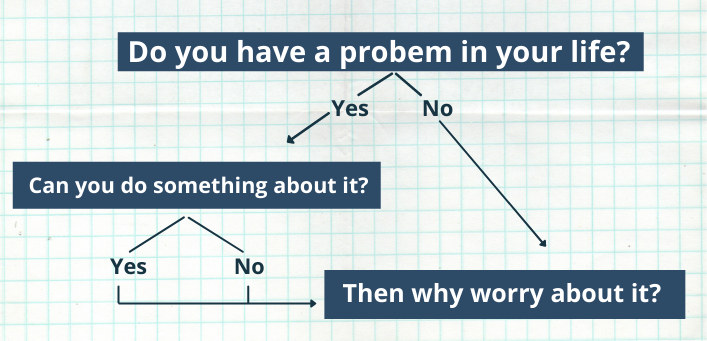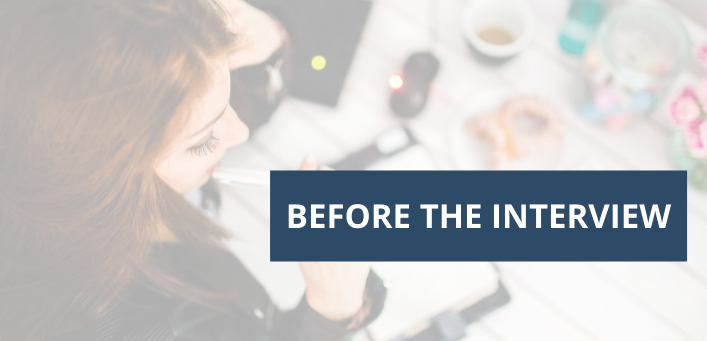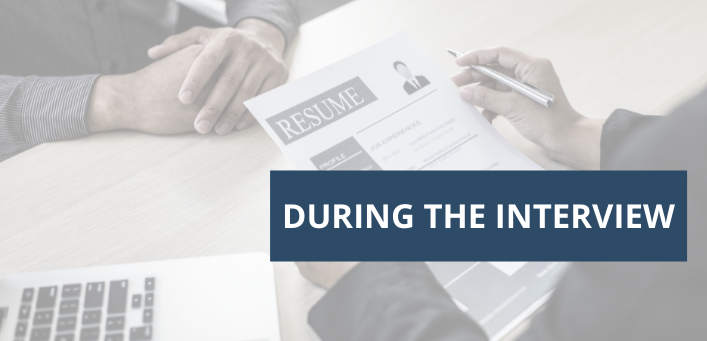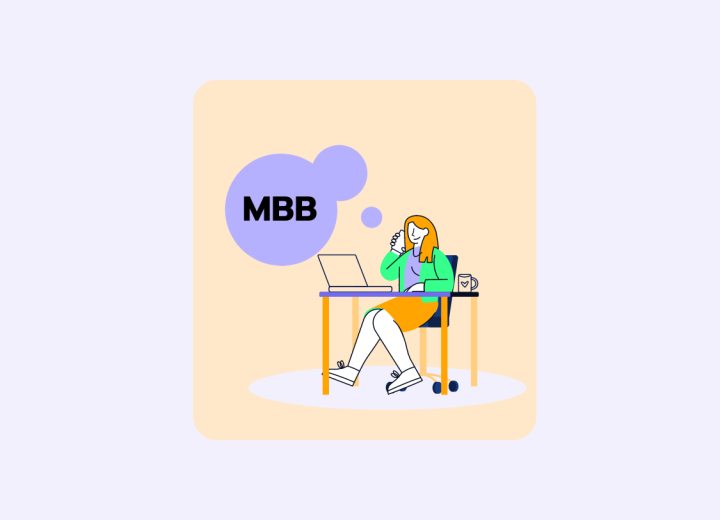“Why am I always so stressed before and during job interviews?”, “Isn't there any way to reduce my stress and anxiety level?” These are questions that probably everyone will come across at some point in their career. Of course, most people are nervous before an important job interview, and a little excitement is part of the job and has never hurt anyone. However, excessive stress and anxiety should be a cause for concern. This article will help you get clear on the reasons why you are feeling stressed and how to handle stress and anxiety before and during job interviews.
Job Interview Stress – How to Handle Stress at an Interview


We manage our finances, our home, or our life
I personally don’t like the term “stress management”. We manage things that are dear to us or that matter to us. We manage our finances, our home, or our life. There is nothing good about stress that needs to be managed. It’s not a nice thing to have and must be kept at a distance as much as possible. There is no badge of honor in being stressed out all the time.
Why do we feel stressed?
It’s important to understand why one feels stressed, anxious or nervous during an interview. The simple answer is this- you are doing it to yourself. The situation itself is not causing stress or anxiety. It’s the way you are reacting to it. You chose to be in that interview, and no one is forcing you to (I hope not!). You are unable to deal with your own thoughts and related emotions. One thing leads to another and you feel stressed out. You create a lot of performance pressure on yourself.
The way you think is the way you feel. And the way you feel is the way you think. This is a loop in which too many people get stuck without knowing it. It’s like an autopilot system running you.
The exaggerated focus on thoughts and the mind
Do you consciously listen to your heart or liver or spleen or stomach? No! You just leave them alone to do their job. So, why the exaggerated focus on thoughts and mind? Use them when you want, otherwise ignore them. This requires a lot of practice and won’t happen overnight. If you notice your mind drifting and creating negative thoughts, catch them and ignore them. Come back to what you were doing in the present moment. Be relentless with this.
So, you have an interview coming up, what can you do before and during the interview to deal with the anxiety?




1. Prepare well
Don’t leave any gaps in your preparation as these can trigger anxiety. Enjoy the preparation phase as there is a lot to learn. Get familiar with the full recruitment lifecycle: research, networking, CV, cover letter, application, interview preparation & performance, and offer. Plan well, start your preparation early, and pay attention to every aspect leading up to the interview. Try not to rush things and don’t cut corners as every step adds to the success. If your preparation is comprehensive throughout the recruitment lifecycle, your anxiety will be naturally lower.
There is a great deal to learn as well during this process. You will come across new concepts, ideas, books, people, and blind spots. Be open, flexible, and enjoy the process. Take sufficient breaks to recharge and don’t forget to celebrate the mini success (no matter how small). This way the experience becomes pleasant and less stressful.
2. Remove peer pressure
What’s happening with your friends/peers/colleagues has no real existence for you. Learn from them, get inspired, and wish them luck. Focus on what you can do i.e., just give your best in every situation to steer your life where you want it to go. Your life is your making, and their life is theirs. Comparing yourself all the time will only damage your focus and before you know it, you end up living someone else’s life or emulating someone else’s success.
3. You chose to be in that interview
No one has put a gun to your head and forced you to attend the interview (I hope not). So, isn’t it a bit ridiculous to feel anxious about something that you genuinely want to do? You worry about everything that could go wrong or dread the fact that someone is evaluating you. Let go of these thoughts and emotions.
4. Feel grateful for the opportunity
Remember that so many people around you and in the world don’t get the opportunities that you have. All the good things we have are somehow easily forgotten. We get too busy worrying all the time. So, pause whenever you can and be thankful for all the fantastic things in life - education, safety, good health, family, friends, etc. It’s a great privilege and opportunity which millions around the world don’t have, unfortunately. The interview process is yet another opportunity given to you. Be grateful and enjoy it.
5. Take that chance
Remember that the interviewing company is giving you an opportunity. So, they deserve to see your best. Once you get the interview call, the ball is in your court now. The company is giving you a chance and it's yours to grab. So, in reciprocity, they deserve to see your best.
6. Gather information about the interviewer
If possible, through your research or networking try and find out more about the interviewer - their style, likes, hobbies, or anything that you could weave into your conversation. This could become a good conversation pivot. But be cautious to do this in a genuine way and only if you feel comfortable doing so. Or else you risk coming across as fake.
7. Eat something light
A light meal or fruits before the interview will keep you energetic and sharp. Don’t go into the interview with a full-loaded stomach. Keep yourself well hydrated.
8. Push yourself with music
Listen to some soothing music or watch something funny. It’s your personal choice but the right type of music has a profound impact on calming the human system. Explore this as an option to help calm the nerves and perhaps even fire up some adrenaline.
9. Clear your mind
Meditation used to be and still is my personal favorite indulgence before I enter any big situation. In fact, I now meditate daily, first thing in the morning. There are plenty of short (15-30mins) guided meditation videos available online and on apps. Try and experiment and settle on that which works for you, helps you relax and be in the moment. Make this a daily practice if you can.
Otherwise, going for a short walk in an open park (if possible, for you) before the interview could also do wonders to calm the nerves. Regular exercise must also become part of your routine and not just left to certain key days or moments in the week.


1. Take one interview at a time
More often than not, we are either regretting our past or worrying about the future. The past has happened and can’t be changed. The future is yet to be created. You have the present moment to act based on what you have learned from the past and where you want to steer your life in the future. But don’t let your past make you act in a way that you struggle to create a new future. If something happened in the past, doesn’t mean it will happen again, unless you let it. With this in mind, take it one step at a time i.e., one interview at a time. Don’t worry about the next rounds or what’s going to happen if you fail the interview. Keep your expectations aside. If you have given your best and continue to do so, good things will happen.
2. Focus on giving your best
Perhaps the interviewer is having a bad day, or they are not friendly at all or it’s just not your day. Regardless, don’t make things too personal or take things too seriously. This is not a matter of life & death and all you can really do is to remain focused and give your best. You can’t control outside situations or dictate the interviewer’s behavior. Neither is every interview going to be great nor is every interview going to be bad. But you can try & ensure that you continue to be present and try as much as you can. If you give up too easily or fall short of giving your best, regret & anxiety will follow.
3. Sit straight
This sounds trivial, but if your body slumps during the interview you will feel tight & tense. A good sitting posture promotes blood circulation. So, sit straight and catch yourself every time you notice the body slouching. Keep both feet firmly on the ground and avoid twitching or any other nervous motions. Keep a gentle but firm gaze. If your body remains calm & still, the mind will follow.
4. Drink water
Have a glass of water next to you and sip as required. This can be a good tactic to slow things down a bit and buy you some extra seconds while you think. Don’t overdo it though.
5. Breathe slowly and deeply
Allow yourself to take three slow deep breaths if you notice your pulse racing. The more air (and more oxygen) that goes into your system, the sooner it calms down. Breathe this way at the start of the interview as typically this is when the nerves are at their highest. But you can always breathe this way as required during the interview. Just be mindful to not breathe forcefully or let out a big sigh in front of the interviewer.
6. Smile and be relaxed
Focus on enjoying yourself, truly open to learning something new from this experience. The interviewer is another person, and this interaction is a new opportunity for you and for them too. Humans unconsciously mimic the emotions of the person in front of them. You may have noticed this. Sometimes when you are with a friend or sibling who is angry (or happy), you get angry (or happy) as well without realizing it. So, try and be relaxed (and smile as required) and the interviewer will have no choice but to follow suit.
7. Learn from your performance
If the interview goes well, pat yourself on the back but still be mindful of the little things you could have done better. Take note of them, work on them and do better next time. If the interview doesn’t go that well, don’t beat yourself down. What’s done is done. Rather, focus on areas of improvement and get working on them. Use the situation to make yourself stronger and better. Rejection is part of the process and pretty much everyone faces it. Remember, neither are you a good fit for every company nor is every company a good fit for you.


Life is short and before you know it, time passes. Be grateful for all the good things and learn to deal with the undesirable things. Dealing with stress, anxiety, or nerves in an interview setting has a lot to do with mindset shift as described in detail in this article, in addition to holistic interview preparation.
Besides that good preparation is the key to not only a successful but also a stress-free interview. Are you ready to rock your next interview, stress-free of course? Make sure to browse through further helpful content on PrepLounge:

With the help of our stress questions tool, you can not only practice the most common interview questions before your interview, but also practice them in a simulated stress situation. As soon as you see the question, a timer starts running down. This way, you are perfectly prepared, even for interviews where you are under time pressure.
With the help of our stress questions tool, you can not only practice the most common interview questions before your interview, but also practice them in a simulated stress situation. As soon as you see the question, a timer starts running down. This way, you are perfectly prepared, even for interviews where you are under time pressure.

Practice cases from our extensive case library to improve your problem-solving skills. Our selection of case studies mirrors the wide variety of real case interviews. You can solve challenging problems around market sizing, market entry, pricing, or operations strategy. Moreover, all provided cases are marked with a level of difficulty and the respective case style.
Practice cases from our extensive case library to improve your problem-solving skills. Our selection of case studies mirrors the wide variety of real case interviews. You can solve challenging problems around market sizing, market entry, pricing, or operations strategy. Moreover, all provided cases are marked with a level of difficulty and the respective case style.

Discover our insider tips where you can find many helpful articles about the consulting industry as well as special articles about interview and interview preparation. Do you want to prepare for behavioral interview questions or the "Tell me about yourself" prompt? Check out our articles!
Discover our insider tips where you can find many helpful articles about the consulting industry as well as special articles about interview and interview preparation. Do you want to prepare for behavioral interview questions or the "Tell me about yourself" prompt? Check out our articles!

Are there any questions left? Ask them in our Consulting Q&A, where everyone can ask and answer questions. Our experts are happy to help you with their expertise!
Are there any questions left? Ask them in our Consulting Q&A, where everyone can ask and answer questions. Our experts are happy to help you with their expertise!
Continue to Learn



